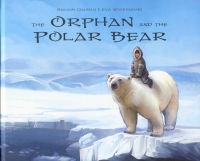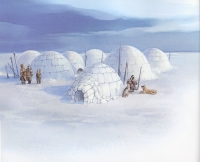| ________________
CM . . . . Volume XVIII Number 20 . . . . January 27, 2012
excerpt:
The Orphan and the Polar Bear is a traditional Inuit story about a young boy, orphaned and taken in by a group of hunters, who learns his life lessons from a polar bear elder. The bear observes how badly the orphan is treated by the men, and one day the bear reveals himself and takes the boy across the water to where the polar bears live. There, the boy learns to hunt and fish. He is, however, still bullied by one of the polar bears who steals whatever the boy catches. The bear elder instructs the boy to harpoon the bear the next time this happens, which he does. Thinking that the bully bear is dead, the boy is surprised and frightened when the bear returns and demands to see the orphan. When the boy finally goes to face the bear, his harpoon spear is returned, and there is an understanding between the two. The bear never bothers the boy again. Eventually, the boy, once he learns all the skills and lessons he needs to learn, is returned across the sea to the human side. “And that is the story of how a boy was trained by polar bears to become a man and a capable hunter.”
That lack of familiarity may catch some people off guard, though. Taken literally, the message of the book includes some violence. The boy doesn’t use his words, as kids are often told to do today, to resolve his problem. He harpoons and kills the bear in order to stand up for himself. And, clearly, he is rewarded for it by gaining the respect of the bears. The “fight back” concept may not resonate with today’s youth. The elder bear is wise and counsels some caution when the bully bear wants to go after the humans, because the humans have dogs that can and will attack the polar bears, harming them a great deal. Self-preservation and prudence are included as lessons in becoming a man. In other words, nothing in life is simple, and the story reflects that. Told in a way that is easy for children to listen to doesn’t mean that the underlying cultural and moral meanings are easy or simplistic. This is a great book to introduce people to a culture with which they may not be familiar, and a fantastic way of preserving a story for future generations of the people who belong to it. Highly Recommended. Barb Janicek is a Children’s Librarian with Kitchener Public Library, in Kitchener, ON.
To comment
on this title or this review, send mail to cm@umanitoba.ca.
Copyright © the Manitoba Library Association. Reproduction for personal
use is permitted only if this copyright notice is maintained. Any
other reproduction is prohibited without permission.
NEXT REVIEW |
TABLE OF CONTENTS FOR THIS ISSUE
- January 27, 2012.
AUTHORS |
TITLES |
MEDIA REVIEWS |
PROFILES |
BACK ISSUES |
SEARCH |
CMARCHIVE |
HOME |

 The book’s “Foreward” makes clear that The Orphan and the Polar Bear is part of a collection being published by Inhabit Media Inc. as an initiative to preserve and share traditional oral stories. As such, The Orphan and the Polar Bear is a great success. You can almost hear the voice of the storyteller in your head. The illustrations enhance and support the story without overtaking it, and Widermann’s attention to detail captures cultural images and evokes the traditions that the story aims to capture while remaining simple enough for children to enjoy and understand. The book makes traditional Inuit folklore and mythology accessible to people who may not be familiar with it.
The book’s “Foreward” makes clear that The Orphan and the Polar Bear is part of a collection being published by Inhabit Media Inc. as an initiative to preserve and share traditional oral stories. As such, The Orphan and the Polar Bear is a great success. You can almost hear the voice of the storyteller in your head. The illustrations enhance and support the story without overtaking it, and Widermann’s attention to detail captures cultural images and evokes the traditions that the story aims to capture while remaining simple enough for children to enjoy and understand. The book makes traditional Inuit folklore and mythology accessible to people who may not be familiar with it.